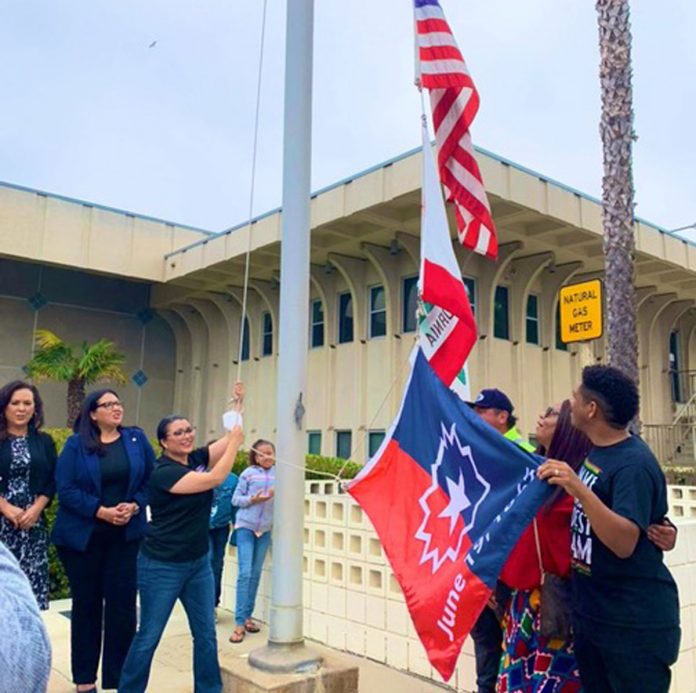At a June 15 City Council meeting, elected leaders approved flying the Juneteenth, LGBTQ, Kumeyaay-Digueno and Fire Fighter Mourning flags above government buildings as a visual indication that the local municipality is accessible to all residents. That vote came just days after the State of California lifted COVID-related measures that had limited physical access to some government buildings for over a year.
National City Mayor Alejandra Sotelo-Solis said the city wanted to welcome residents back with “not only an open door but also cultural representation” with flags that reflect people in the community.
The city subsequently hoisted the Juneteenth flag on Saturday in remembrance of slavery coming to a final end in 1865, over two years after it was made illegal in the United States with the 13th amendment of 1863.
District 1 Supervisor Nora Vargas, who attended the event, looked both to the past and the future, said that raising the Juneteenth flag in National City “was special because it allowed for celebration and reflection of the progress we’ve made as a country in ensuring that all Americans are free” but also “served as a reminder of the hard work we have ahead in advocating for racial justice and equity”.
The city also raised the rainbow LGBTQ flag on Saturday and will keep the flag aloft throughout the month of June. June was officially declared Gay and Lesbian Pride month by former president Clinton, a month chosen in remembrance of the 1969 Stonewall Inn riots.
California State Assemblywoman Lorena Gonzalez, who also attended Saturday’s event, said raising the flags sends a clear message that “we’re here for everybody” as residents come out of the pandemic.
“#RepresentationMatters is not just a hashtag. Government should uplift diversity and inclusion from within and represent the values and ideas of everyone in our communities. We need to ensure that we represent the values of everyone in our community and work for all, not just a few,” Vargas said.
Sotelo-Solis said doing this kind of event allows the city to shine a light on those communities that may not have always had representation at a municipal building.
“There will be people who will think it isn’t enough or that it is too much but that’s how we end up having a healthy dialogue and appreciating those differences and those varying perspectives, it’s how we move forward with a good quality of life,” Sotelo-Solis said.
A light was shone on many inequities during the pandemic, Gonzalez said, from prison reform to food scarcity to lack of healthcare.
“I have not heard anybody say ‘we have to go back to how things were’. We have to move forward and there is an understanding with progressive policy makers that if we don’t have equity, we’ve failed,” Gonzalez said, and gave the example of universal internet access.
“We just learned how important it is for every child to have access to the internet for school, then they grow up and function in government. It’s not a social movement, it’s a reality… For example, we have money available for rental relief but some of our constituents don’t know how to access it. We need to open doors for those people who have traditionally found them closed,” Gonzalez said, speaking metaphorically.
On the other hand, Sotelo-Solis is looking ahead to actually having more doors on brick-and-mortar buildings that, when opened, lead to service centers for some of the city’s more marginalized communities.
“We incorporated making sure we’re part of the county-wide Pride celebration to recognize the South Bay LGBT Center here in the region. We know there are needs specific to the community and, if you’re not familiar with the fact that there is a support center, you may continue to feel isolated and alone. We want our youth to know there are services in the region and it may even open up an opportunity to have an office here,” Sotelo-Solis said.
The Juneteenth flag-raising event was “amazing,” Sotelo-Solis said, because some bikers came from as far as Los Angeles to support the Black Girls Do Bike cyclist community in attendance.
“That spoke volumes about the intersectionality of the day, allowed us to serve as an inclusive community with visible bike paths connecting neighborhoods from San Ysidro to Coronado,” Sotelo-Solis said, spoke to how elected officials can make choices to create a community that “lends itself to getting out of a vehicle” which in turn leads to visibility.
The Kumeyaay-Diegueño flag will be flown on Indigenous People’s Day, the second Monday in October annually and the Mourning flag will be flown at city fire stations, a decision Sotelo-Solis said is a little different than the flags raised Saturday but recognizes firefighters simultaneously answered COVID-related calls on top of fighting fires and celebrates living with dedication and passion.
“Long after this, we’re going to continue asking ‘what’s next?’ to create a foundation for solutions and not just talk. Saturday showed that people are coming to our community because of the dialogue and we’re not going to stop being better public servants,” Sotelo-Solis said.












